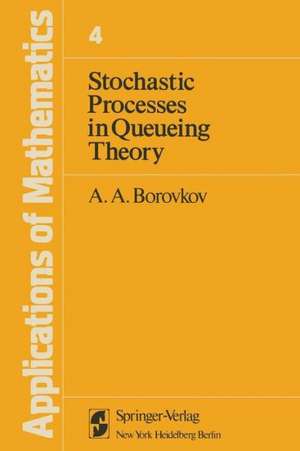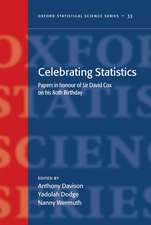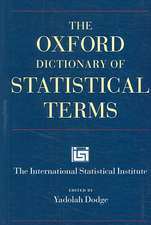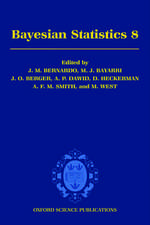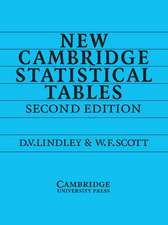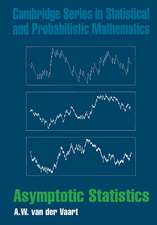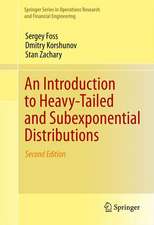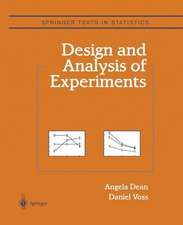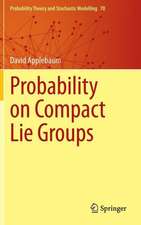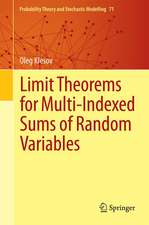Stochastic Processes in Queueing Theory: Stochastic Modelling and Applied Probability, cartea 4
Autor Alexandr Borovkov Traducere de K. Wickwireen Limba Engleză Paperback – 21 oct 2011
Din seria Stochastic Modelling and Applied Probability
- 17%
 Preț: 464.60 lei
Preț: 464.60 lei - 18%
 Preț: 805.44 lei
Preț: 805.44 lei - 18%
 Preț: 1110.72 lei
Preț: 1110.72 lei - 18%
 Preț: 947.35 lei
Preț: 947.35 lei -
 Preț: 390.84 lei
Preț: 390.84 lei - 18%
 Preț: 952.40 lei
Preț: 952.40 lei - 15%
 Preț: 648.56 lei
Preț: 648.56 lei - 18%
 Preț: 951.91 lei
Preț: 951.91 lei - 15%
 Preț: 637.13 lei
Preț: 637.13 lei - 18%
 Preț: 793.63 lei
Preț: 793.63 lei -
 Preț: 391.02 lei
Preț: 391.02 lei -
 Preț: 401.42 lei
Preț: 401.42 lei - 15%
 Preț: 639.08 lei
Preț: 639.08 lei - 18%
 Preț: 733.33 lei
Preț: 733.33 lei - 18%
 Preț: 785.11 lei
Preț: 785.11 lei - 15%
 Preț: 593.42 lei
Preț: 593.42 lei - 18%
 Preț: 1114.96 lei
Preț: 1114.96 lei - 15%
 Preț: 643.16 lei
Preț: 643.16 lei -
 Preț: 390.63 lei
Preț: 390.63 lei - 15%
 Preț: 645.60 lei
Preț: 645.60 lei - 15%
 Preț: 641.71 lei
Preț: 641.71 lei - 18%
 Preț: 954.62 lei
Preț: 954.62 lei - 15%
 Preț: 645.14 lei
Preț: 645.14 lei - 18%
 Preț: 947.50 lei
Preț: 947.50 lei - 18%
 Preț: 804.96 lei
Preț: 804.96 lei - 15%
 Preț: 644.63 lei
Preț: 644.63 lei - 20%
 Preț: 469.59 lei
Preț: 469.59 lei - 20%
 Preț: 581.39 lei
Preț: 581.39 lei
Preț: 388.13 lei
Nou
Puncte Express: 582
Preț estimativ în valută:
74.28€ • 77.11$ • 61.94£
74.28€ • 77.11$ • 61.94£
Carte tipărită la comandă
Livrare economică 22 martie-05 aprilie
Preluare comenzi: 021 569.72.76
Specificații
ISBN-13: 9781461298687
ISBN-10: 1461298687
Pagini: 296
Ilustrații: XI, 280 p.
Dimensiuni: 155 x 235 x 16 mm
Greutate: 0.42 kg
Ediția:Softcover reprint of the original 1st ed. 1976
Editura: Springer
Colecția Springer
Seria Stochastic Modelling and Applied Probability
Locul publicării:New York, NY, United States
ISBN-10: 1461298687
Pagini: 296
Ilustrații: XI, 280 p.
Dimensiuni: 155 x 235 x 16 mm
Greutate: 0.42 kg
Ediția:Softcover reprint of the original 1st ed. 1976
Editura: Springer
Colecția Springer
Seria Stochastic Modelling and Applied Probability
Locul publicării:New York, NY, United States
Public țintă
ResearchCuprins
§ 1. Classifications. Some Notation.- 1. Systems with Queues and Service of Type One.- § 2. Cases in Which the Systems ‹G› Can be Described by Means of Recursion Equations. Equivalence to the System ‹G, G, G, 1›.- § 3. The Basic Equation. Properties of the Solution as a Process. Ergodic Theorems.- § 4. Interrupted Governing Sequences.- § 5. On Systems Governed by Sequences of Independent Random Variables.- § 6. The Virtual Waiting Time. A Continuous Analogue of the System Equation. Properties of the Solution.- § 7. Further Properties of the Process w(t). Beneš’ Equation.- § 8. The Stationary Solution of Beneš’ Equation. Approximation Formulae for Heavy and Light Traffic.- § 9. The Processes X(t) and Y(t) with Stationary Increments Corresponding to Governing Sequences with Independent Terms. The Connection between the Distributions of wc(t) and wk.- § 10. Estimates of the Rate of Convergence of the Distributions of wn and w(t) to Stationarity. Connection with the Queue Length.- § 11. Theorems on the Stability of the Stationary Waiting Time under a Change of the Governing Sequences.- 2.Some Boundary Problems for Processes Continuous from below with Independent Increments. Their Connection with the Distribution of w(t).- § 12. Boundary Problems for Processes Continuous from below with Independent Increments.- § 13. Properties of the Distribution of w(t). The Busy Period.- § 14. Discrete Time.- 3. Boundary Problems for Sequences with Independent Increments and Factorization Identities.- § 15. Preliminary Remarks.- § 16. The First Factorization Identity and Its Consequences.- § 17. The Second Factorization Identity and Its Consequences.- 4. Properties of the Supremum of Sums of Independent Random Variables and Related Problems of QueueingTheory.- § 18. Uniqueness Theorems.- § 19. Methods of Finding the Distribution of $$\bar{Y}$$.- § 20. Explicit Formulae for the Distribution of $$\bar{Y}$$ under the Conditions of Queueing Theory.- § 21. Stability Theorems. The Rate of Convergence.- § 22. Asymptotic Properties of the Distributions of $$\bar{Y}$$ and ?.- § 23. Inequalities for the Distributions of $$\bar{Y}_n$$ and $$\bar{Y}$$. The Rate of Approach of the Distributions of wn and w1.- § 24. Comparison Theorems.- § 25. Conditions for Heavy Traffic. Transitional Phenomena.- § 26. The Relation between the Waiting Time and Queue Length Distributions.- 5. Multi-Channel Queueing Systems.- § 27. Classes of Systems Which Can Be Described by Recursion Equations. Existence Theorems for a Stationary Solution in the Systems ‹G, G,G/m, 1›. The Relation between the Waiting Time and the Queue Length.- § 28. The Systems ‹GI, GIGI/m, 1›. Stability Theorems. Connection between the Waiting Time and Queue Length. Estimates of Rates of Convergence.- § 29. The Systems ‹GI 1, E/m, 1› and ‹E, GI, GI/m, 1›.- 6. The Systems ‹G, G, G/?, 1) with an Infinite Number of Service Channels.- § 30. Theorems on Convergence to Stationary Processes.- § 31. Stability Theorems.- § 32. The Systems ‹ GI, G, GI/?, 1›.- § 33. The Systems ‹E, 1, GI/?, 1›.- § 34. The Systems ‹G„ 1, EI/?, 1›.- 7. Systems with Refusals.- § 35. The Systems ‹G, G, G/m, 1›R. General Theorems.- § 36. Stability Theorems.- § 37. The Systems ‹GI, 1, GI/m, 1›R.- § 38. The Systems ‹GI GI, E/m, GI›R.- § 39. The Systems ‹G›R.- § 40. Asymptotic Analysis of Multi-Channel Systems.- 8. Systems with Autonomous Service.- § 41. General Properties.- § 42. Methods of Calculating the StationaryDistributions.- Appendices.- Appendix 1. Some Theorems from Renewal Theory.- Appendix 3. The Wiener-Lévy Theorems and the Asymptotic Behavior of the Coefficients of Absolutely Convergent Series.- Appendix 4. Estimates for the Distributions of Sums of Independent Random Variables.- List of Basic Notation.- Bibliographical Notes.- Author Index.
